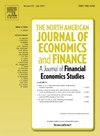Is energy risk scale Invariant? evidence from crude oil futures
IF 3.8
3区 经济学
Q1 BUSINESS, FINANCE
North American Journal of Economics and Finance
Pub Date : 2025-05-29
DOI:10.1016/j.najef.2025.102476
引用次数: 0
Abstract
This study diverges from earlier research by utilizing power-law functions to model realized variances in crude oil prices and analyzing these functions across various time scales. The findings reveal several key insights. First, uncertainty in crude oil markets exhibits fractal-like properties, manifested in scale invariant power-law behavior. Second, the estimated power-law exponent demonstrates invariance in the intertemporal dimension, a result confirmed through the test for total invariance, which did not reject the hypothesis of total invariance in power-law behavior. Third, the study provides evidence that the variance of crude oil price variance is statistically infinite, rendering sample variance estimates inherently context-dependent. Fourth, in contrast to earlier literature supporting the lognormal model, the findings decisively reject the lognormal model as a valid data-generating process for realized crude oil price variances across all time scales. These results have significant theoretical and practical implications. The fractal properties and infinite variance challenge conventional assumptions about crude oil market dynamics, while the rejection of the lognormal model highlights the need for alternative frameworks in modeling and risk management.
能源风险量表不变吗?原油期货就是证据
本研究与先前的研究不同,利用幂律函数来模拟原油价格的实际方差,并在不同的时间尺度上分析这些函数。研究结果揭示了几个关键的见解。首先,原油市场的不确定性表现出分形性质,表现为尺度不变的幂律行为。其次,估计的幂律指数在跨时间维度上表现出不变性,这一结果通过对总不变性的检验得到证实,该检验没有拒绝幂律行为的总不变性假设。第三,该研究提供的证据表明,原油价格方差的方差在统计上是无限的,使得样本方差估计本质上依赖于上下文。第四,与早期支持对数正态模型的文献相反,研究结果明确地拒绝将对数正态模型作为所有时间尺度上已实现原油价格差异的有效数据生成过程。这些结果具有重要的理论和实践意义。分形特性和无限方差挑战了关于原油市场动态的传统假设,而对数正态模型的拒绝强调了在建模和风险管理中需要替代框架。
本文章由计算机程序翻译,如有差异,请以英文原文为准。
求助全文
约1分钟内获得全文
求助全文
来源期刊
CiteScore
7.30
自引率
8.30%
发文量
168
期刊介绍:
The focus of the North-American Journal of Economics and Finance is on the economics of integration of goods, services, financial markets, at both regional and global levels with the role of economic policy in that process playing an important role. Both theoretical and empirical papers are welcome. Empirical and policy-related papers that rely on data and the experiences of countries outside North America are also welcome. Papers should offer concrete lessons about the ongoing process of globalization, or policy implications about how governments, domestic or international institutions, can improve the coordination of their activities. Empirical analysis should be capable of replication. Authors of accepted papers will be encouraged to supply data and computer programs.

 求助内容:
求助内容: 应助结果提醒方式:
应助结果提醒方式:


